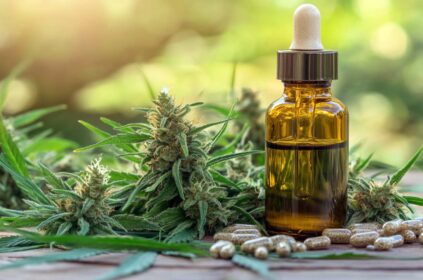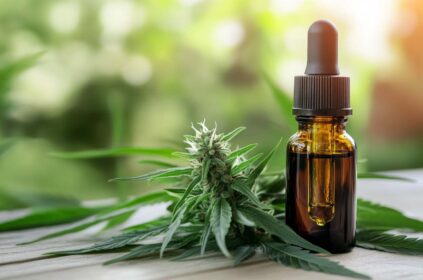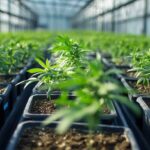Introduction to CBD and Autism Spectrum Disorder (ASD)
Autism Spectrum Disorder (ASD) is a multifaceted neurodevelopmental condition that presents unique challenges in social interaction, communication, and behavior. With approximately 1 in 59 children affected by ASD in the United States, parents and caregivers are continually searching for effective treatments to improve quality of life. Among the hopeful solutions emerging on the horizon is cannabidiol (CBD), a prominent compound derived from the cannabis plant. This non-psychoactive cannabinoid is drawing attention for its potential to help manage certain symptoms associated with ASD.
Understanding CBD
CBD is one of over a hundred cannabinoids identified in the cannabis plant. Unlike its more famous counterpart, tetrahydrocannabinol (THC), which is known for its psychoactive effects, CBD offers a different profile. It does not create the “high” commonly associated with marijuana usage. Instead, CBD interacts with the body’s endocannabinoid system—a network crucially involved in regulating various physiological and cognitive processes. This system plays a major role in maintaining homeostasis and responding to various environmental stimuli, including stress and anxiety.
In recent years, growing interest in CBD’s therapeutic potential has set the stage for deeper exploration, particularly for conditions like ASD. Much of this attention stems from anecdotal reports of parents who have witnessed positive changes in their children using CBD products, sparking a wave of interest among researchers and families alike.
Current Research and Studies
Several studies are underway that explore the functionality and effectiveness of CBD in treating symptoms associated with ASD.
NYU Langone Study
One notable effort comes from NYU Langone’s Department of Child and Adolescent Psychiatry. Researchers are assessing the effects of CBD in children ages 7 to 17 diagnosed with both ASD and attention-deficit hyperactivity disorder (ADHD). Over a ten-week period, participants are closely monitored to determine whether CBD alleviates symptoms such as social difficulties, anxiety, irritability, and sleep disturbances. Early observations are expected to provide foundational data for further understanding CBD’s capabilities in this arena.
UC San Diego Clinical Trial
At UC San Diego, a Phase III clinical trial seeks to determine whether CBD can effectively reduce severe behavioral issues in children with ASD. In this randomized, double-blind crossover study involving participants aged 7 to 14, researchers are conducting comprehensive evaluations that include behavioral assessments, MRI scans, and electroencephalograms. Observing these children over the course of the study will help inform whether CBD has the potential to address common ASD challenges effectively.
Case Study Insights
In a 2022 case study, researchers examined a unique instance involving a nine-year-old boy diagnosed with nonverbal ASD. After treatment with a combination of high CBD and low-dose THC oil, the child demonstrated marked improvements in behavior, social interactions, concentration, and emotional stability. Such anecdotal evidence, complemented by ongoing clinical research, adds another layer to our understanding of how CBD could help children journey through the complexities of ASD.
Benefits of Using CBD for ASD
As research on CBD advances, several potential benefits specific to ASD have surfaced.
Enhancing Social Communication and Behavior
Emerging studies suggest that CBD may assist children in improving social communication while alleviating some behavioral issues associated with ASD. According to initial findings, children treated with CBD-rich cannabis have reported notable improvements in social symptomatology, including reduced irritability, aggressiveness, and hyperactivity.
Addressing Anxiety and Sleep Disturbances
This cannabinoid has shown promise in decreasing anxiety—particularly types like panic and separation anxiety—affecting children on the spectrum. A significant number of patients involved in research have reported overall improvements in autism symptoms, showcasing CBD as a potential adjunct therapy aimed at enhancing emotional and physical well-being.
Influencing Neurochemical Pathways
CBD is thought to impact neurochemical pathways that engage with the endocannabinoid system. Many experts believe that this interaction can modulate nerve cell signaling in specific brain regions critical to regulating anxiety and behavior. The early stages of research hint at the potential for CBD to facilitate behavioral improvements and social interaction enhancements, which are often troublesome for children with ASD.
Potential as a Therapy
While CBD displays potential, it is important to approach this treatment as a complement rather than a replacement for conventional therapies. For instance, integrating CBD into a child’s treatment plan might enhance the effectiveness of existing behavioral therapies, or even reduce reliance on standard medications, such as antipsychotic drugs, in some children.
Future Directions and Considerations
As we look ahead, several key considerations are paramount in the discourse surrounding CBD and ASD:
- Dosage and Formulation: Current research suggests that CBD dosages should be tailored to the child’s weight, starting conservatively at around 0.7 mg/kg per day. The quest for optimal dosages and effective formulations—especially the potential of full-spectrum CBD combined with trace THC—is still underway.
- Long-Term Effects: Many existing studies are of short duration. This prompts a need for long-term research to adequately assess the sustained impacts of CBD treatment on ASD symptoms. Understanding the long-term efficacy and safety of CBD is crucial.
- Regulatory Clarity: The FDA’s approval of Epidiolex—a CBD medication for treating certain seizure disorders—has opened doors for further inquiry into CBD’s broader therapeutic possibilities. However, regulatory apprehensions remain, necessitating clear guidelines to ensure safe and accessible uses of CBD for ASD.
Conclusion
The exploration of CBD in managing Autism Spectrum Disorders is a burgeoning field filled with hope and potential. While preliminary research indicates that CBD might provide benefits, including enhancements in social communication, reductions in behavioral disturbances, and alleviation of anxiety-related issues, comprehensive and long-term studies will be necessary to fully understand its role. As knowledge grows and interest intensifies, CBD could emerge as an integral part of therapeutic approaches for individuals with ASD, ultimately enriching their lives and those of their families.
Actionable Tips and Next Steps
- Consult Healthcare Professionals: Before implementing CBD as a possible treatment, it’s imperative to have thorough discussions with healthcare providers regarding potential benefits and considerations.
- Participate in Clinical Trials: Families may consider engaging in clinical trials currently researching CBD for ASD, contributing their experiences while potentially accessing cutting-edge treatments.
- Stay Informed: Keeping abreast of developments in CBD research through credible and reliable sources can empower families with knowledge about evolving treatments.
Through an amalgamation of factual accuracy and relatable experiences, this guide aims to foster understanding and encourage exploration of CBD’s potential role in supporting children diagnosed with Autism Spectrum Disorder.




















